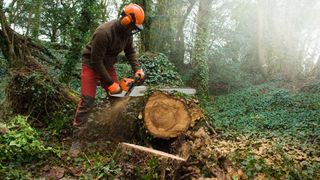We spoke to chainsaw expert Thomas Goodman to find out everything you need to know about how to cut down a tree with a chainsaw, as well as what safety considerations to keep in mind - and when it’s important to consult a professional to cut down your tree rather than cutting it down yourself. If you haven’t yet bought a chainsaw, or are considering which one will best meet the needs of you and your garden, don’t forget to take a look at our guide to the best chainsaws (opens in new tab) you can buy.
How to cut down a tree with a chainsaw
We consulted with Thomas Goodman to find out the steps you need to take to cut down a tree with a chainsaw safely and efficiently. Step 1 “Start by clearing the area around the tree. You will need to look at how far the tree will fall,” Goodman explains. “Set out your perimeter and ensure the area around the tree is clear. There must be escape routes in all directions. Check for any nearby power lines, buildings, or fences that may affect the tree felling.” Step 2 “Next, you’ll want to plan out the notch. Take some chalk and mark out where you will be cutting the notch on the fall side of the tree. The notch must go no further than one-third into the tree and should not be higher than your waist. Mark a 90-degree angle with around 60 degrees on the top side and around 30 degrees on the bottom. Step 3 “Once the notch is set, it’s time to make the cut. Use your chainsaw to make the cut. Do the top cut first, and then make the bottom cut. If the wedge doesn’t drop out by itself, extend either side of the cuts until it eventually does. Avoid going too deep. Step 4 “Once you’ve completed the main cut, you’ll then move on to the felling cut. Mark a line with some chalk between the highest parts of the notch on both sides of the tree and use this as a guide. Start the felling cut from the opposite side of the fall side. Step 5 Finally, be ready for the tree to fall. When you make the fell cut, be ready to run as the tree could fall at any moment. It’s a good idea to have someone behind you who can point out when the tree starts to fall. Never turn your back on the tree when you run away so that you know how fast you need to leave the area.”
Safety tips for using a chainsaw
Needless to say, a chainsaw can be a dangerous piece of kit even for experienced chainsaw users. Keeping in mind some basic safety measures will stand you in good stead. Goodman says making sure you’re familiar with the chainsaw before using it is very helpful, as well as wearing protective gear and following certain rules. “Read the user manual and ensure you know everything about the chainsaw before using it,” he advises. “Understand your limits. If you don’t feel comfortable, it’s better to call a professional to do the work for you. Always wear protective gear, including goggles, hearing protection, gloves, boots, chaps, and a hard hat. “If you are a beginner, start simple with the projects. Don’t cut alone. Always have someone close by in case something goes wrong. Just make sure they’re not too close to you as to put themselves in danger. “Always keep a first aid kit nearby. Never cut wood that is being held by someone else. When you start your chainsaw, make sure the chain brake is on. Always hold the chainsaw with two hands. Never use just one hand. Never climb a tree with the chainsaw. Don’t rush anything. Relax and do everything slowly to avoid mistakes. “Inspect the chainsaw before you use it. Make sure the safety features are working and the chain is on the guide bar tightly. Don’t ever cut using the tip or nose of the chainsaw as this can cause a kickback which can lead to injuries. “Never cut with a chainsaw above your head. Allow the chainsaw to cool down before refueling. Turn the chain saw off when moving from tree to tree. Never use a chainsaw on a ladder. Use a scabbard when transporting your chainsaw. Keep the chainsaw out of reach of children at all times.”
What the expert says…
“If the tree is already dead, it isn’t safe to try to cut this down yourself. Climbing onto a dead tree could put you at serious risk. The tree simply won’t be stable enough to take your weight. “A professional will be able to identify any weak parts of the tree and remove them safely without risking their health or without the risk of damaging any nearby properties. “If you want to get rid of the tree stump in addition to the tree, you will have to call a professional. Even when it comes to a smaller tree, the stumps can be very difficult to remove on your own. Tree stumps usually require specific pieces of machinery to be removed.” Discover more guides for the garden… Best leaf blowers (opens in new tab) Best pressure washers (opens in new tab) Best patio heaters (opens in new tab) Best inflatable hot tubs (opens in new tab)

